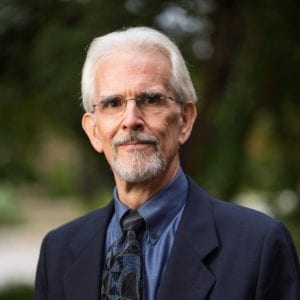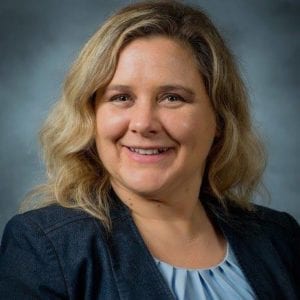The Chicago School of Professional Psychology started with a single program: The Psy.D. in Clinical Psychology. As its flagship program, the Psy.D. in Clinical Psychology is integral to The Chicago School—and now found at all seven of its campuses across the country.
In this series, we spotlight Clinical Psychology faculty at three campuses: Dallas, Los Angeles, and New Orleans. These experts have a trove of experience and insights to offer, and we’re proud to showcase them.
For our first spotlight, we hear from Michelle Macera, Ph.D., and Timothy Branaman, Ph.D., ABPP, from the Dallas Campus.
 |
 |
The Psy.D. in Clinical Psychology is The Chicago School’s flagship program. What separates it from other universities that offer it?
Dr. Branaman: Consistent high-quality training in psychology as well as nursing, clinical psychopharmacology, and other health-related services. These programs provide an excellent model for training in integrated health services.
Dr. Macera: I am impressed with the opportunities that The Chicago School offers to give students the edge they need when clinical students apply for their pre-doctoral internship year and compete nationwide with other students who have similar grades and clinical hours. I am thinking of the study-abroad program, student organization participation, community service activities, and so much more.
Why did YOU choose to work at TCSPP?
Dr. Macera: First, let me say that I am grateful TCSPP chose me! I taught undergraduate psychology for a decade, then I got graduate-level teaching experience at a medical school, so teaching in a Psy.D. program seemed like a natural next step in my career.
Dr. Branaman: While the primary focus of my career has been in a clinical/forensic practice group I established after completing my doctoral training, I have always enjoyed teaching and had previously done so both at a community college as well as 10 years in a graduate Psy.D. program. When I learned TCSPP was opening its Dallas campus with its first cohort of Psy.D. students, I was quick to let it be known I was interested in the possibility of teaching there. I was familiar with TCSPP as well as the faculty who would be there and was excited by the opportunity. TCSPP’s academic programs also aligned well with my professional experience in specializations of forensic practice and integration of psychopharmacology with clinical practice.
What is your favorite thing about teaching clinical psychology at TCSPP?
Dr. Branaman: I’m early on in my experience as this is my first semester with TCSPP and of course it has been an unusual one due to the COVID-19 pandemic. The support from the departmental staff has tempered the steepness of the learning curve for me in making a shift to online synchronous teaching and utilizing various apps along with the tele-video platform. Being able to work with experienced, professional, and collegial staff is important to me.
Dr. Macera: I am currently teaching Psychometrics, and I will be teaching Adult Psychopathology and Clinical Interviewing in the spring. I enjoy the small class size, with only seven students in one section and eight in the other. I know all of my students personally, and I can give very individualized attention and feedback to help them prepare for exams or write papers.
I was nervous to begin my teaching experience at TCSPP via Zoom lectures, but I have come to like this format. I like to use the polling feature to engage the class and to use the breakout rooms for them to discuss topics with each other. I even found the polling and breakouts to be more effective than in-class discussions.
What research have you done? What area of psychology do you like to focus on?
Dr. Branaman: My professional and research interests have been in two areas, not necessarily related to one another. These include forensic practice and the regulation of the practice of psychology in general. My research interest in forensic practice has been in the areas of assessment and treatment of sexual offenders as well as the potential effects of therapy on witness testimony. My interest in the jurisdictional regulation of licensing and oversight of psychologists grew out of having served for nearly 13 years on the Texas State Board of Examiners of Psychologists with 10 of those years in the role of chair for the board. A broad range of changes in regulatory terrain in general as well as circumstances unique to Texas has resulted in my interest in writing and speaking about related issues.
Dr. Macera: I earned a Ph.D. in Clinical Psychology from West Virginia University, a Research-1 institution. My interests have been in the areas of anxiety and eating disorders.
My dissertation focused on the use of storytelling to guide behavior and my presentation of these results won both the Elsie Ramos Research Poster Award from the Association for the Advancement of Behavior Therapy, and the Best Research Poster Award from the Society for a Science of Clinical Psychology, which is a division of the American Psychological Association (APA).
For my master’s thesis, I found that acceptance-based coping is more effective than trying to control panic attack symptoms. My presentation of this research won first place in the Sigma Xi Professional Research Society Graduate Student Research Post competition.
As a graduate student, I also did research on the use of literal progressive muscle relaxation instructions (“lift your shoulders up to your ears”) versus metaphorical relaxation instructions (“pretend you are a turtle going into your shell”). We found that anxious preschool children complied better with the metaphors, but preschoolers with attention deficit symptoms complied better with the literal instructions.
Another interesting research study involved the use of homophones, words that sound alike but have different spellings and meanings. We asked participants to spell words they heard pronounced on a tape recording. Some of these words were homophones with threatening versus nonthreatening spellings and meanings, such as grown/groan, berry/bury, flew/flu, dye/die, etc. We found that participants with higher levels of anxiety sensitivity were more likely to spell the threatening versions of the words they heard.
Finally, I published several clinical case studies on the use of Acceptance and Commitment Therapy (ACT) with clients I worked with in our department training clinic. After publishing the first case study on the use of ACT to treat anorexia, an acquisitions editor from a publishing company contacted me, and I authored The Anorexia Workbook with my mentor.
After I earned my Ph.D., I was the research coordinator at a residential eating disorder treatment center and collected data to assess treatment progress at admission, post-treatment, and follow up.
What is the key takeaway you hope students have when graduating from TCSPP?
Dr. Branaman: That education is an ongoing experience. The professional acculturation and training they will have when graduating from TCSPP will be a solid foundation on which they will continue to build while being proud of the foundational training program and the faculty that provided them that foundation.
Dr. Macera: I still remember my first semester of graduate school, when the professor of my professional development course said that a psychologist should never work in isolation because when you work alone, you are at risk of making mistakes. That was a valuable takeaway that has stuck with me for 20 years: Stay engaged with the field, attend conferences, participate in professional organizations, consult your colleagues, be part of a treatment team. TCSPP offers excellent student support services, but students need to recognize when they need help and reach out using the resources here, just as they should be doing after graduation, when they enter clinical practice.
Learn more about the Psy.D. in Clinical Psychology
The Chicago School of Professional Psychology’s Psy.D. in Clinical Psychology programs prepare students for careers in a wide range of settings, including nonprofit, health care, community, and the government. Building upon a strong base of coursework, theory, science, and practice, and guided by our practitioner-scholar faculty, our graduates are well prepared to provide assessment, intervention, and consultation to meet the needs of diverse populations. Learn more by visiting our clinical psychology program page at the Dallas Campus or complete the form below to request more information.

